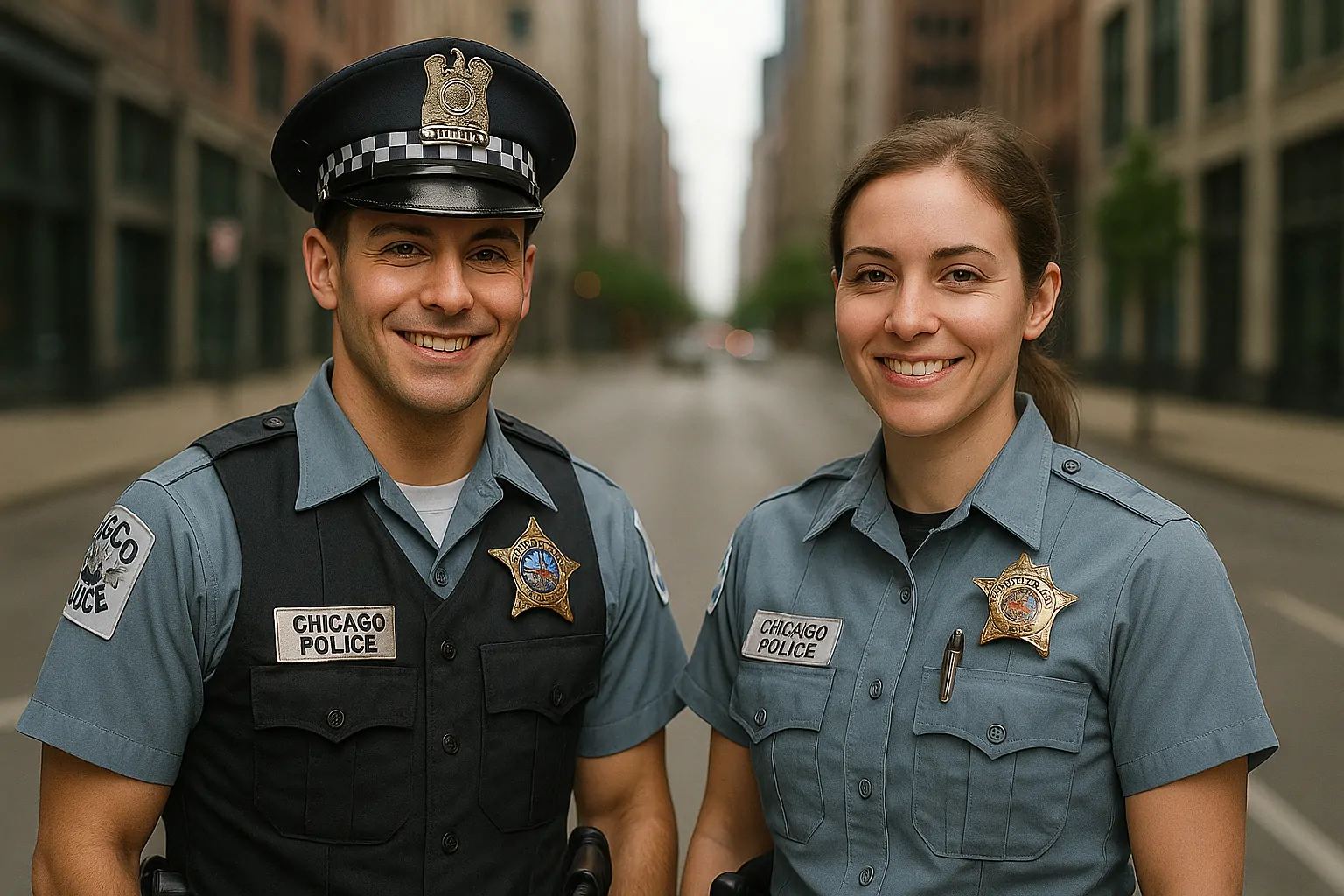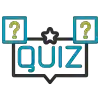Pass the Chicago Police Exam On First Try: CPOE QuickPass Expert Prep & Free Practice Test
- Practice Test
- Exam Format
- Curriculum
- Reviews
Each CPD recruitment drive follows a familiar pattern: thousands apply, most fail the CPOE, and many face a 12-month wait to try again. The Chicago Police Exam isn’t mysterious—it’s a standardized measure of reasoning, problem-solving, and psychological fitness. Success isn’t luck; it comes from mastering its timed cognitive challenges and nuanced personality inventory.
CPOE QuickPass turns preparation into a predictable outcome, with a streamlined strategy that fast-tracks your path to a passing score. Test yourself now—take the free practice exam to see if you’re academy-ready or need the strategic boost to guarantee it.
Free Chicago Police Exam Practice Test
10 Questions | 7 Minutes
What is the Chicago Police Exam?
The Chicago Police Officer Exam (CPOE) is the first major step in the hiring process for new recruits. It’s a written assessment designed to determine whether candidates have the fundamental skills needed to perform as officers.
Administered through Pearson VUE testing centers or the secure OnVUE online system, the exam focuses on core abilities such as problem-solving, reasoning, and attention to detail. Rather than testing law knowledge, it measures how well you can think under pressure and handle the challenges of real police work.
These core abilities are central to law enforcement exams nationwide. For instance, the New York State Police (NYSP) and NYPD exams also test reasoning, judgment, and situational awareness — skills essential to effective policing in any jurisdiction.
Format of the Chicago Police Exam
The CPOE is a single, continuous 2.5-hour computer-based exam that combines two distinct parts to evaluate your potential as a candidate. In total, you'll answer 200 questions designed to assess both your cognitive skills and your behavioral tendencies.
Part 1: Cognitive Abilities Test
This section contains 80 multiple-choice questions that measure the critical thinking and reasoning skills essential for effective police work. You will be tested on 10 specific abilities, including:
-
Deductive Reasoning
This tests the ability to apply general rules to specific situations. On the job, it is used when interpreting laws, policies, or procedures to make correct and consistent decisions.
-
Flexibility of Closure
This tests the ability to spot a familiar figure, word, or object hidden in distracting material. On the job, it is applied when identifying suspects from descriptions or images.
-
Inductive Reasoning
This tests the ability to combine pieces of information into a logical conclusion. On the job, it is used when piecing together details of an investigation to determine what likely occurred.
-
Information Gathering
This tests the ability to follow rules to arrange items in the correct sequence. On the job, it is applied when recording evidence, completing forms, or following procedural steps accurately.
-
Problem Sensitivity
This tests the ability to recognize when something is wrong or likely to go wrong. On the job, it is used when identifying threats, risks, or problems in everyday situations.
-
Selective Attention
This tests the ability to stay focused despite distractions or repetition. On the job, it is used when monitoring environments, noticing patterns, or concentrating on details during repetitive tasks.
-
Spatial Orientation
This tests the ability to understand positions and directions in space. On the job, it is used when navigating streets, buildings, or responding quickly from one location to another.
-
Verbal Comprehension
This tests the ability to read and understand written material. On the job, it is applied when reviewing statutes, reports, or policies to ensure correct interpretation and compliance.
-
Verbal Expression
This tests the ability to communicate clearly in writing. On the job, it is used when preparing reports, memos, or narratives so information is conveyed accurately and effectively.
-
Visualization
This tests the ability to picture how objects or people look after changes. On the job, it is applied when recognizing suspects who alter appearance to avoid identification.
Part 2: Personality & Behavioral Section
Following the cognitive test, you will face a 120-item behavioral assessment. This is not a test with right or wrong answers. Instead, it uses a Likert-scale format (e.g., "Strongly Agree" to "Strongly Disagree") to evaluate your personality, motivations, and integrity.
Common Challenge: This section is a significant source of anxiety for many applicants, who often struggle with how to answer authentically while still demonstrating the traits CPD is looking for.

CPOE QuickPass
Last Updated: Sep 23, 2025
Course Content
-
 Introduction 1 StepBuy this Course: Get full access to all lessons, practice tests and guides.
Introduction 1 StepBuy this Course: Get full access to all lessons, practice tests and guides. -
 Flexibility of Closure 2 StepsBuy this Course: Get full access to all lessons, practice tests and guides.
Flexibility of Closure 2 StepsBuy this Course: Get full access to all lessons, practice tests and guides. -
 Deductive Reasoning 2 StepsBuy this Course: Get full access to all lessons, practice tests and guides.
Deductive Reasoning 2 StepsBuy this Course: Get full access to all lessons, practice tests and guides. -
 Inductive Reasoning 2 StepsBuy this Course: Get full access to all lessons, practice tests and guides.
Inductive Reasoning 2 StepsBuy this Course: Get full access to all lessons, practice tests and guides. -
 Information Gathering 2 StepsBuy this Course: Get full access to all lessons, practice tests and guides.
Information Gathering 2 StepsBuy this Course: Get full access to all lessons, practice tests and guides. -
 Problem Sensitivity 2 StepsBuy this Course: Get full access to all lessons, practice tests and guides.
Problem Sensitivity 2 StepsBuy this Course: Get full access to all lessons, practice tests and guides. -
 Selective Attention 2 StepsBuy this Course: Get full access to all lessons, practice tests and guides.
Selective Attention 2 StepsBuy this Course: Get full access to all lessons, practice tests and guides. -
 Spatial Orientation 2 StepsBuy this Course: Get full access to all lessons, practice tests and guides.
Spatial Orientation 2 StepsBuy this Course: Get full access to all lessons, practice tests and guides. -
 Visualization 2 StepsBuy this Course: Get full access to all lessons, practice tests and guides.
Visualization 2 StepsBuy this Course: Get full access to all lessons, practice tests and guides. -
 Verbal Comprehension 2 StepsBuy this Course: Get full access to all lessons, practice tests and guides.
Verbal Comprehension 2 StepsBuy this Course: Get full access to all lessons, practice tests and guides. -
 Verbal Expression 2 StepsBuy this Course: Get full access to all lessons, practice tests and guides.
Verbal Expression 2 StepsBuy this Course: Get full access to all lessons, practice tests and guides. -
 Behavioral Orientation 2 StepsBuy this Course: Get full access to all lessons, practice tests and guides.
Behavioral Orientation 2 StepsBuy this Course: Get full access to all lessons, practice tests and guides. -
 Full Length Practice Quiz 3 StepsBuy this Course: Get full access to all lessons, practice tests and guides.
Full Length Practice Quiz 3 StepsBuy this Course: Get full access to all lessons, practice tests and guides. -
 Bonus - Interview Process 1 StepBuy this Course: Get full access to all lessons, practice tests and guides.
Bonus - Interview Process 1 StepBuy this Course: Get full access to all lessons, practice tests and guides. -
 Bonus - Medical Evaluation 1 StepBuy this Course: Get full access to all lessons, practice tests and guides.
Bonus - Medical Evaluation 1 StepBuy this Course: Get full access to all lessons, practice tests and guides. -
 Bonus - Background Screening 1 StepBuy this Course: Get full access to all lessons, practice tests and guides.
Bonus - Background Screening 1 StepBuy this Course: Get full access to all lessons, practice tests and guides. -
 Bonus - Psychological Evaluation 1 StepBuy this Course: Get full access to all lessons, practice tests and guides.
Bonus - Psychological Evaluation 1 StepBuy this Course: Get full access to all lessons, practice tests and guides. -
 Bonus - Polygraph Test 1 StepBuy this Course: Get full access to all lessons, practice tests and guides.
Bonus - Polygraph Test 1 StepBuy this Course: Get full access to all lessons, practice tests and guides.
Why Most Candidates Fail the Chicago Police Exam
Passing the CPOE isn't about intelligence—it's about preparation. Every year, strong candidates fail because they underestimate this exam's unique and demanding nature, walking in expecting a standard test and leaving blindsided. Here are the most common reasons candidates fail:
Expecting a Standard Test
Many are blindsided by bizarre formats—like spotting hidden patterns (Flexibility of Closure) or staying focused during intentional distractions (Selective Attention). These twists trigger panic and weed out the unprepared.
Overthinking the Personality Section
With 120 behavioral questions and conflicting advice, applicants second-guess themselves into inconsistent profiles—getting silently screened out without realizing it.
Trusting Free Prep
The official PDF is outdated, and generic videos ignore the CPOE's unique format. Relying on them builds false confidence and leaves candidates unready for the exam's complexity and psychological traps.
Test Fatigue
This 2.5-hour, 200-question marathon drains focus. Fatigue causes poor pacing, sloppy mistakes, and collapsing scores.
Turn These Pitfalls Into Your Advantage
Each of these pitfalls is entirely avoidable. The candidates who receive an academy invitation don't just study—they prepare with a strategy built specifically for the challenges of the CPOE.
Why Choose CPOE QuickPass?
When the stakes are this high, “generic prep” won’t cut it. CPOE QuickPass was built specifically for the Chicago Police Exam—giving you the exact tools you need to clear the written test and move forward in the hiring process.
| Feature | CPOE QuickPass | Other Generic Prep |
|---|---|---|
| Practice Content | ✔️200+ targeted questions | ✘Limited sample items |
| Full-Length Simulations | ✔️2 full exams (timed & untimed) | ✘Usually none or partial-length tests |
| Skill Coverage | ✔️10+ quizzes: cognitive & behavioral | ✘Skips key CPD-tested skills |
| Realistic Practice | ✔️Real CBT format with timing | ✘Static PDFs, no timing |
| Section Mastery | ✔️Complete cognitive & behavioral prep | ✘Often ignores personality/behavioral section |
| Risk-Free Trial | ✔️7-day money-back guarantee | ✘No refunds or complicated returns |
| Extra Resources | ✔️Interview, background & medical prep included | ✘Rarely included |
| Proven Results | ✔️936+ passed, 4.8★ Trustpilot | ✘Unverified results |
With CPOE QuickPass, you’re not just studying; you’re training to win—don’t let a year-long wait hold you back!
Success Stories
4.6 108 Reviews
rob, 16 Jan
Solid review course that covers the…
Solid review course that covers the relevant topics in good detail
chad, 11 Jan
Great Program, amazing practice simulations
Easy to understand. Passed tests on first time thru.
QUEEN RIGHTEOUS, 07 Jan
Highly recommended.Great instructional…
Highly recommended.Great instructional information. I passed on the first try.
MasterCommand, 14 Nov
Prepterminal. Prepare, practice, execute.
To say that Prepterminal helped me prepare and be ready for the testing phase would be an understatement. At first, looking at the course, I felt overwhelmed with the course material, but the course broke down each subject effectively which made it easier to understand. There were a few issues with some of the audio portion of the testing course, but beyond that, the course was well worth the money.
Abazix LLC, 09 Nov
Would recommend
Study material helped to pass my test on the first try.
Natalia M. Delgado, 08 Nov
Exelent course 100% guaranteed
Exelent course 100% guaranteed
Frequently Asked Questions (FAQs)
Can I take the Chicago PD exam at home?
Yes. Candidates can schedule the exam either at a Pearson VUE test center or through OnVUE online proctoring, which allows you to test from home under secure supervision.
What is the passing score for the Chicago Police exam?
After completing the Physical Fitness Test (PFT) and Cognitive Test, you will take the Structured Oral Interview (SOI). Scores range from 0 to 100, with 70 required to pass. The City of Chicago does not release exact scores—only pass/fail results. However, the nationally accepted passing threshold for the NCJOSI-2 cognitive test, on which the CPOE is based, is about 70%.
What happens if I fail the exam?
If you fail the CPOE, you must wait a full 12 months from your exam date before you are eligible to take it again. This significant delay is why passing on the first attempt is so critical.
If a high score doesn't matter, how does the hiring list work?
After passing the exam, all successful candidates are placed on a referral list in a random lottery order. A candidate who barely passed has the same chance of being called as a candidate who scored perfectly. This is why your entire focus should be on securing a pass, not chasing a high score.
When is the next Chicago Police Department Exam?
Applications for the 2025 Chicago Police Officer position are open from February 27, 2025, through December 31, 2025. Qualified applicants receive an Authorization to Test email from Pearson VUE to schedule their examination.
What are the next steps after passing the CPOE exam?
Successful candidates are contacted 2–4 weeks after the exam with instructions for the next hiring phase, which includes Processing Day, background checks, medical/psych evaluations, and the P.O.W.E.R. fitness test. The full hiring process typically takes 4–9 months from application to academy entry.
How hard is the Chicago Police Written Exam?
The selection process is described as “very competitive” by CPD. The more you prepare, the more likely you are to improve your score and advance in the hiring process.
Can I refuse the CPD polygraph and stay in the hiring process?
No. Refusing the polygraph almost always removes you from consideration—CPD requires full cooperation, and declining is treated as non-cooperation (immediate disqualification).
CPOE QuickPass includes a bonus guide on how to pass the polygraph test effectively to help you prepare with confidence.
What is the POWER Test in the Chicago Police Hiring Process?
The POWER Test (Peace Officer Wellness Evaluation Report) is a mandatory physical fitness exam required for entry into the Chicago Police Academy. It is given in two stages: a practice Pre-POWER (not pass/fail) and a Final POWER (pass/fail). Candidates must pass all four parts—sit-and-reach, sit-ups, bench press, and a 1.5-mile run—with standards based on age and gender to continue in the hiring process.
*Note: CPOE and other trademarks are the property of the Chicago Police Department or their respective trademark holders. None of the trademark holders are affiliated with PrepTerminal or this website.

Created by: Michael Lerner
BSc, Psychometric Tutor, Prepterminal Test Expert
1462 students, 4.6, 108 Reviews
Hi there! Welcome to CPOE QuickPass. I’m Michael—here to help you with any questions about your Chicago Police Exam Prep. Feel free to reach out to me at: [email protected].
